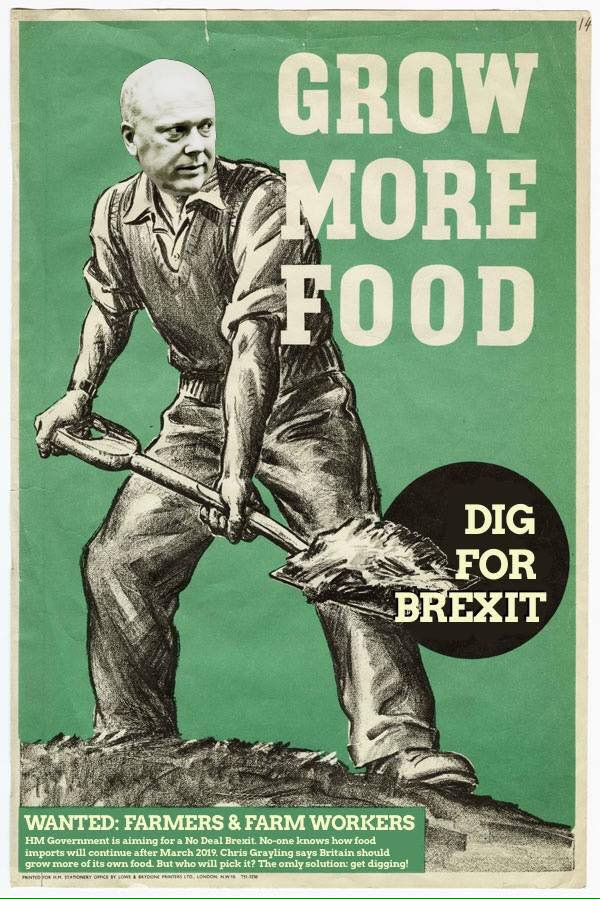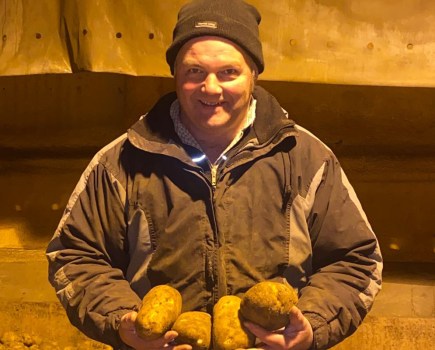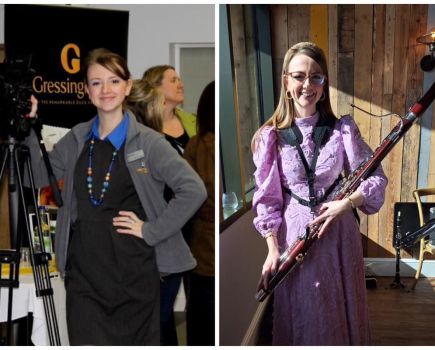Whichever side of the Brexit fence you may be sitting, last month was an uneasy one for those of us in the Agricultural Industry – glyphosate, neonicotinoids, a new environment watchdog with statutory powers. It all adds to the uncertainty farming businesses are having to cope with.
The Government revealed its ignorance on more than one occasion with my highlight being the ‘Dig for Brexit’ comments made by UK transport secretary Chris Grayling. His conviction that it won’t be a big deal if the UK is unable to agree a trade deal with the European Union is extraordinary. His rationale behind this belief is that the UK can make up for the loss of tariff-free movement of food across the single European market by importing more food from beyond Europe and by British farmers simply ‘growing more food’.

Twitter came alive with tweets after Chris Grayling’s comments, such as the above from @jonworth.
Perhaps he doesn’t know the extent of our trade deficit. Maybe he has forgotten that the biggest contributors to this deficit are the fruit and vegetable sectors and I dare say that he hasn’t considered that with the loss of immigrant labour, these are the very sectors that will struggle the most.
It bothers me that, by AHDB estimates, only the top-performing 25% of farms will remain profitable without being supported at a similar level to the EU Common Agricultural Policy. In the UK the gap between the most profitable farmers and the least profitable is widely reported to be the biggest it’s even been and widening.
So without doubt it’s time to take the microscope to farming businesses, decide how they can be made ‘fitter’ and prepare for an era that will most likely be without agricultural support as we know it. As well as examining costs of production, employing new technology will play an important part on the journey to increase the UK’s productivity. With this in mind, it was surprising to hear recently a number of different conference speakers attribute our productivity lag (behind our neighbouring EU nations) to a reluctance to adopt new technology in the UK.
As John Chinn says, UK farming is about to enter a modern agricultural revolution and, in his role as chairman of the Agri-tech centre CHAP, he believes science will have a key role to play. For me, visiting him at his farm near Ross-on-Wye was particularly interesting, not least because 20 years ago I used to be his agronomist. In those days, R&D was already playing an important role on the farm with trials being conducted by Cambridge University Farms to help refine the production of Maris Peer for Tesco’s as ‘baby new’ packed in punnets, irrigation was scheduled, and the farm was using weather stations and models to predict blight.
Soil erosion was a problem then that was largely ignored, with piles of red sand a common occurrence on the roads after heavy rain. John admits it was a slap on the wrists from the Environment Agency that precipitated the work done by Cranfield University on the farm. The problem of erosion needed to be solved for the farm to continue to grow asparagus and typically John turned to science to find the answer.
I have to admit that although I’ve already written a couple of articles about CHAP, it remained a fairly nebulous concept and I wasn’t really sure where it would fit in amongst all the other established institutions we already have. When I learned of John’s involvement, I was fascinated to hear his vision of the future and the future role of the Agri-tech centres – to me it made sense of their existence. I came away from our meeting feeling very reassured that CHAP has a grower at its heart who’s determined to make sure the Agri-tech centres provide what other growers need to get through the next few years and kick-start a rise in productivity.
One of the things John is pressing Government for is some form of transitional support to help some growers adopt improved production practices – a carrot to encourage change. Whether or not this will happen remains to be seen. One thing is clear in my mind, CHAP has the potential to be the cogs in the engine driving improved farming practice, but needs our engagement to achieve this.
Based in Ludlow, Shrops, CPM technical editor Lucy de la Pasture has worked as an agronomist. @Lucy_delaP




